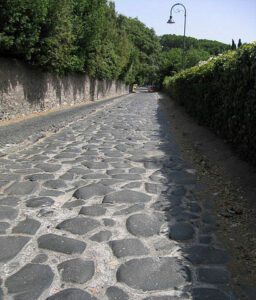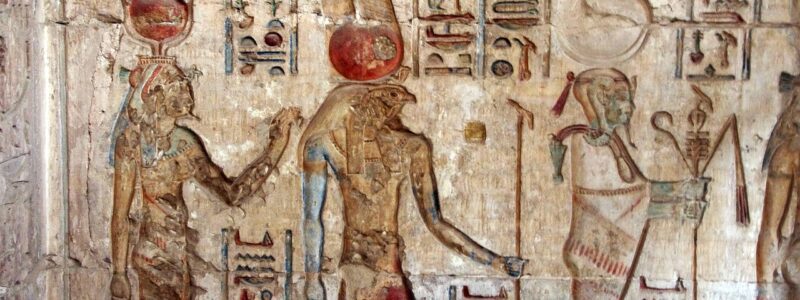Roman Roads
Roman roads helped the message of Christianity spread throughout the Roman Empire more quickly and efficiently. Building an integrated road system throughout the Empire did not happen with serious planning. It also required much time and treasure to build a road system where there was none.
One reason for this extraordinary building effort was that roads enabled quicker movement of Roman soldiers throughout the Empire wherever needed. Peace throughout the Roman world allowed resources to be reallocated from war to infrastructure improvement. But it also enabled Christian missionaries to spread the Good News more quickly.
History of Transportation Throughout the Ancient World

Wheels were invented early in human history.
There are many components of any system of transportation. Wheels were invented very early in world history, probably in Mesopotamia. This enabled four-wheeled carts and chariots to be developed to carry cargo too bulky or heavy for animals to haul.
The development of wheeled vehicles was remarkable, but the lack of roads limited their utility. Most roads at the time were just cleared pathways and hardly conducive to the mass movement of goods across any distance. Had Christ come into the world at this time, his message would have had difficulty spreading across the world.
Persia Develops a Road System
Persia had a vast empire and needed a reliable system of communication. They became the first to develop a reliable road system. Darius the Great was the first ruler to build a road system called the “Royal Road,” starting about 500 BC. The road was 1500 miles long, going from one end of their country to the other..
The ancient historian Herodotus noted that royal messengers were stopped by “neither snow, nor rain, nor hear, nor gloom of night” as they traveled the road. The road reduced the travel time from three months to nine days. This allowed the rulers to communicate throughout the Empire relatively quickly. The downside was that enemy armies could also use these roads to conquer the country. Alexander the Great would later use this road in his conquest of Persia.
Greece Contributes Little to Road Systems
Greece had much more difficulty building roads than its ancient counterparts. Much of Greece is mountainous and rocky, making road b building very difficult. Also, Greek roads were known for being populated with robbers making travel by ordinary people dangerous.
Greece was primarily a maritime culture and moved goods by water rather than land. The ancient Greeks were highly skilled in navigation and shipbuilding, allowing them to colonize and trade across the Mediterranean.
Most roads throughout the ancient world were difficult to travel to other than around major cities and holy sites.
Roman Roads to the Rescue

By Paul VlaarOriginal uploader was Neep at en.wikipedia.Later version (crop) were made and uploaded by Ali’i at en.wikipedia. – http://www.neep.net/photo/italy/show.php?3205, CC BY-SA 3.0, https://commons.wikimedia.org/w/index.php?curid=8767120
The Roman Empire took road building and infrastructure projects much more seriously than civilizations did previously. The Romans understood the need for good, straight roads for the military to protect its vast empire. Roman roads were usually well-paved and maintained throughout the Empire.
Roads were also made straight as much as possible. This made the movement of the military and any equipment easier than going around curves. The need for straight roads caused logistical headaches for planners, however. This often meant the construction of bridges, tunnels through mountains, and aqueducts to bring water to its major cities.
The road system was also kept secure by military posts, making them safer than their Greek roads, which were left unguarded. This meant travelers had less concern about robbers and criminals along the highway. Eventually, Roman roads spanned about 250,000 miles – a remarkable achievement for any ancient civilization.
Roman roads and infrastructure became a symbol of achievement and power. China’s road system also facilitated trade with the Han dynasty of China.
The Appian Way
The Appian Way is probably the most recognized road from ancient Rome. It was started in 312 BC and connected Rome to Southern Italy. The importance of the Appian Way is implicated by its formal name, “the Appian Way, the queen of the long roads.”
The Appian Way was built specifically for transporting troops outside of greater Rome. Rome. The road was instrumental in Rome’s success in the Second Samnite War but also allowed trade and communication to flourish throughout Southern Italy.
Summary
Most ancient civilizations had road systems, although they were often little more than rough pathways. They were also unguarded and so unsafe for commerce and trade.
Persians developed a road about 1500 miles long that enabled central control over much of their empire. Greeks developed little to road development as they were mostly a maritime country relying on travel by sea.
The Romans perfected the art of road building. Much of their ancient road system, especially the Appian Way, is still visible today. In addition to roads, the ancient Romans developed tunnels, bridges, and aqueducts to bring water into their cities. This represents a remarkable development for an ancient civilization that existed millennia ago.
The thousands of miles of Roman roads in existence at the time of Christ allowed his message to disseminate across the Roman world much more easily. The roads were relatively safe, often guarded by Roman soldiers to enable commerce to flourish without fear of robbery.
Next, we will learn about an actual postal system used in the ancient world.




